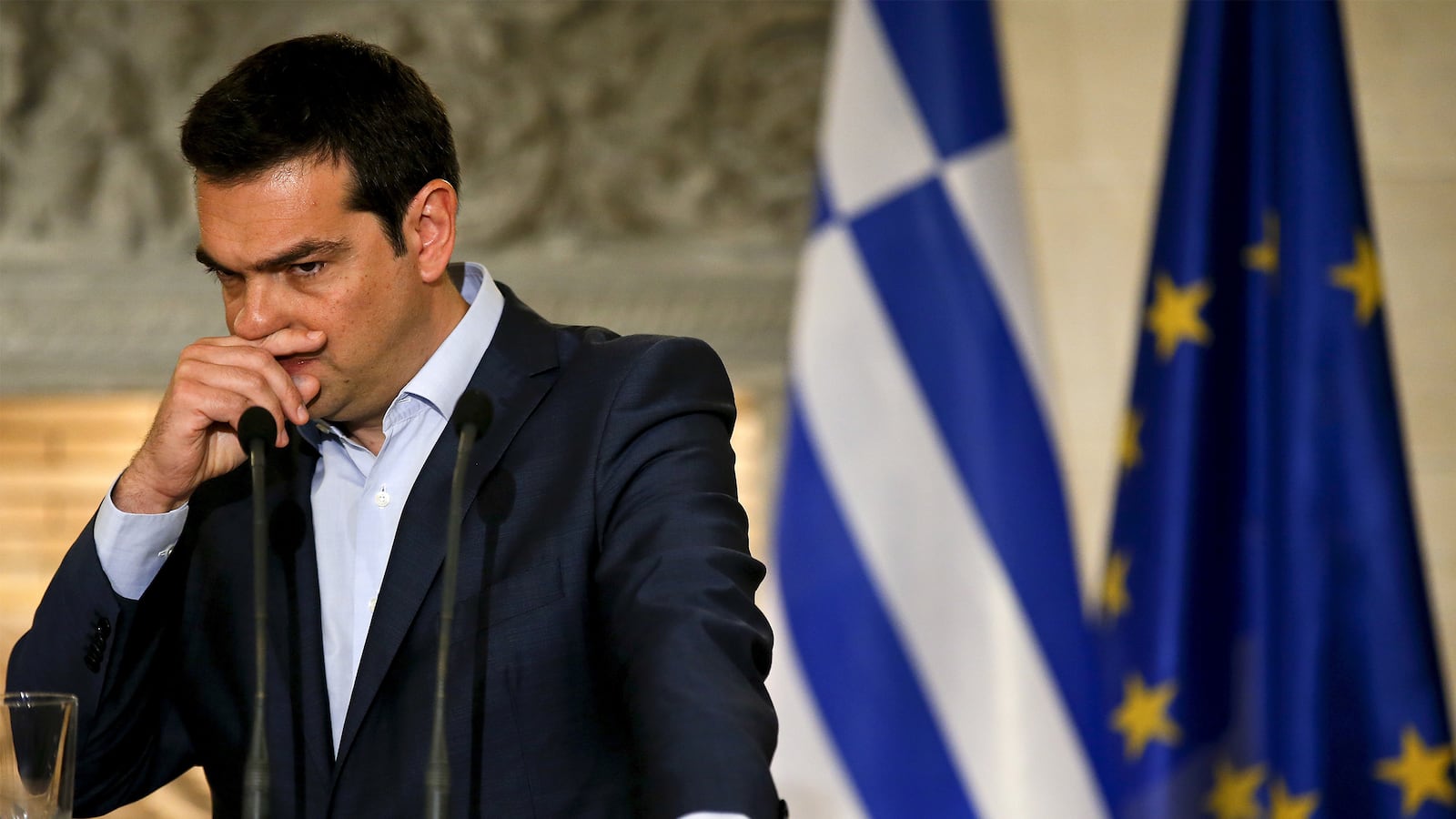The face of Wolfgang Schäuble glowers down at me from a lamppost near the Greek parliament in the center of Athens. Scrawled just below the German Finance Minister’s image, menacingly represented on a poster, is the word “no.”
On the afternoon before a vote that may well determine Greece’s future in the Eurozone the streets of Athens are uncharacteristically calm. Tourists stroll past shops and eat lazily in the heat, taking photos and haggling with street vendors. It’s Greek summer, after all. But the streets are emptier than usual; German and American holiday-makers are in evidence—Greeks, less so. Many of them have left to return to vote in their hometowns and villages. Sunday, July 5, is referendum day. Everyone here knows the importance of what’s coming. And nobody is ambivalent. Emotion and confrontation: It’s politics the Greek way.
Ever since the country’s Prime Minister Alexis Tsipras broke off talks with Greece’s creditors on June 26 to call a referendum allowing the Greek people to vote on an unclear and as yet to be agreed set of creditor proposals, posters urging a “no” vote have sprung up across the city. The referendum may not be about Greece’s membership of the Eurozone but almost everyone here is taking it as such. “Resist, Reclaim, Revolt” reads one; “No to Blackmail and Austerity” reads another. The No campaign, supported by Greek’s governing party Syriza, is sweeping the capital and it is fueled as much by anger as political calculation. “Yes” posters are far fewer in number, and usually content themselves with images of the Greek flag rather than hate figures or demagogic slogans.
Monastiraki Square is one of the most pleasant spots in Athens, and one that perhaps most clearly expresses Greece’s duality. The square sits below the Acropolis, the ancient temple to Athena, the Greek Goddess of Wisdom, whose statue once looked out at over the capital. But she has disappeared along with the ancient Greeks that once worshipped her. Instead, at the corner of the square sits a closed branch of the Attica Bank, its ATMs almost empty of cash ever since the government imposed capital controls on Greece last week. “No to the debt” is splayed across its steel shutters in large graffiti. Ancient history and modern poverty; revered wisdom and reckless lending—these are the opposing narratives that have entrapped the modern Greek people.
The No vote is strong here. A group of around 10 teenagers has gathered round a statue in the square for a Tumblr meet up. Every single one of them, they tell me, will be voting no. “The propaganda from the yes campaign on private TV disgusts me,” says Vasillis, a 19-year old economics student. “If I vote, I’ll vote no definitely.”
I wander up the city into Syntagma Square, just in front of the Greek parliament. Here, I meet Giorgios Erodiakonis, a 60-year old bookstore owner. He is manning a stall urging people to vote no tomorrow. For Erodiakonis the vote is all about Europe and the EU. “I’m voting no tomorrow for one word: freedom,” he tells me. “I want a free country that controls its own economy and makes its own decisions without anyone telling us what to do.”
Erodiakonis may be voting no but he doesn’t support Syriza or Tsipras. “I want us to get out of the Eurozone and out of the EU,” he says. “I don’t agree with the government, which wants us to stay in. But Tsipras did the right thing by calling the referendum. And if tomorrow the no votes wins by 70 percent or more he will have to rethink his position on the entire European question,” he says. “There is no future for the E.U.”
Standing by the stall is a heavily made up blond lady wearing high heels and a tight-fitting outfit. Holding the Greek flag in one hand and the Syriza flag in the other, she poses for photographers and TV cameramen. She asks me where I am from. When I tell her, she asks me what I will vote in Britain’s upcoming E.U. referendum. I say I’ll vote yes. “So you’ll vote for Schäuble, the new Hitler,” she replies, before walking off in disgust.
But if there is a strong consensus for no on the streets, the reasoning behind it is often very different. Pantelis Flatsousis tells me he will also be voting no but not to exit Europe but rather to make it more united. “We need a more democratic Europe,” he says. “I want a close Europe, more like the United States, what we have now is a very loose union designed for the profit of the few. It doesn’t represent the will of the people. I don’t believe in a neoliberal Europe.”
Flatsousis doesn’t see the referendum as an “in or out” on the Eurozone, in which he wants Greece to remain. “This is not a question of the euro or the Drachma but for strengthening our position within the euro. I hope that come Monday, we can start to negotiate for better conditions for Greece.”
He is also scared. “It was wrong, both for Greece and the eurozone, to allow us in in 2001, but now that we are here we need to stay. Leaving will cause social turmoil and with [Neo-Nazi party] Golden Dawn the third-most popular party, and Syriza, a populist party that doesn’t really know itself, in coalition with a hard right party, the situation is very dangerous. The E.U. has to understand that Greece is like a domino: all across Europe, the far right is rising: in France, Hungary, even Germany. It needs to be aware of this, we don’t want economies returning to the terrible situations they were in during the 1930s.”
Despite the seeming domination of no on the streets, Greece’s remains deeply divided on the question. Four polls released just two days before the vote on July 5 each had the Yes vote ahead by a fraction. Yes voters may be less vocal, but they are most certainly there.
Fay Koutzoukou is one, and she is just as adamant in her views as those on the opposing side. “We need more integration with Europe, not less,” she tells me. “We live in a globalized economy in a globalized world and we cannot make it on our own—we’re not Germany. We don’t have a significant economy so we can only make it in partnership with others. More importantly, we can only work our problems out with our European partners if we’re sitting down at the same table with them, not outside the room.”
“Obviously austerity wasn’t the right recipe,” she continues, “we all agree on that. But austerity was supposed to come with reforms and the previous governments never made the reforms, so obviously the recipe failed. This government won’t do the reforms either: They just want the loans. I don’t blame Syriza for the mess we’re in,” she continues, “but I do blame them for their mishandling of the situation over the last six months and the referendum dilemma we are now facing.”
“Whatever anyone says, tomorrow is about being for or against the Euro,” she concludes. “And that’s why I’ll vote yes.”






